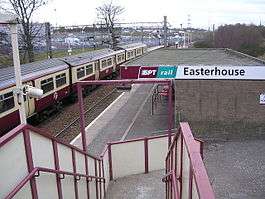Easterhouse railway station
Easterhouse railway station serves the Easterhouse area of Glasgow, Scotland. It was built by the North British Railway as part of their Coatbridge Branch and opened when the branch opened on 1 February 1871.[2] The station is 5¾ miles (9 km) east of Glasgow Queen Street railway station on the North Clyde Line and is managed by Abellio ScotRail.
| Easterhouse | |
|---|---|
| Scottish Gaelic: An Taigh Sear[1] | |
 A Class 320 departing Easterhouse railway station | |
| Location | |
| Place | Easterhouse |
| Local authority | Glasgow |
| Coordinates | 55.8599°N 4.1066°W |
| Grid reference | NS682649 |
| Operations | |
| Station code | EST |
| Managed by | Abellio ScotRail |
| Number of platforms | 2 |
| Live arrivals/departures, station information and onward connections from National Rail Enquiries | |
| Annual rail passenger usage* | |
| 2014/15 | |
| 2015/16 | |
| 2016/17 | |
| 2017/18 | |
| 2018/19 | |
| History | |
| Original company | Coatbridge Bridge, NBR |
| Post-grouping | LNER |
| 1 February 1871 | Opened[2] |
| National Rail – UK railway stations | |
| * Annual estimated passenger usage based on sales of tickets in stated financial year(s) which end or originate at Easterhouse from Office of Rail and Road statistics. Methodology may vary year on year. | |
Daily services
Monday to Saturday daytimes:[3]
- Half-hourly service towards Edinburgh Waverley
- Half-hourly service towards Airdrie
- Half-hourly service towards Balloch via Glasgow Queen Street Low Level
- Half-hourly service towards Helensburgh Central via Glasgow Queen Street Low Level (as of August 2016 this service no longer calls at Shettleston, Cartyne and Bellgrove. Passengers for these stations have to use the half-hourly service towards Balloch instead.)
Evening services are as follows:
- Half-hourly service towards Airdrie via all stations
- Half-hourly service towards Balloch via Glasgow Queen Street Low Level
Sunday services are as follows:
- Half-hourly service towards Edinburgh Waverley
- Half-hourly service towards Helensburgh Central
Rolling stock
The current rolling stock operating the North Clyde Lines is Class 320s. However, during peak-times you could find a Class 318 or Class 334. From 2010, the Class 334s started to operate on the North Clyde Lines due to the Airdrie-Bathgate extension.
Previous operations
From the 1960s after electrification by British Railways, both Class 311s and Class 303s operated the North Clyde Lines. During a fleet cascade it was common to find a Class 314, Class 311 or Class 303. During the 1990s the Class 320s were introduced to the North Clyde Lines. The Class 311s were then withdrawn and both Class 303s and 320s operated together until 2002 when the final Class 303 unit was withdrawn. The Class 334s then entered service. Initially, the units were set for the Ayrshire Lines but they operated the North Clyde lines during peak-hour times. The Class 320s now operate the North Clyde Line, and will do so until 2010, with the occasional visit from a Class 334 or Class 318.
| Preceding station | Following station | |||
|---|---|---|---|---|
| Blairhill | Abellio ScotRail North Clyde Line |
Garrowhill | ||
| Historical railways | ||||
| Bargeddie (NBR) Line open; Station closed |
Coatbridge Branch North British Railway |
Garrowhill Line and Station open | ||
References
Notes
- Brailsford 2017, Gaelic/English Station Index.
- Butt (1995), page 88
- Table 226 National Rail timetable, May 2016
Sources
- Awdry, Christopher (1990). Encyclopaedia of British Railway Companies. Sparkford: Patrick Stephens Ltd. ISBN 1-8526-0049-7. OCLC 19514063. CN 8983.
- Brailsford, Martyn, ed. (December 2017) [1987]. Railway Track Diagrams 1: Scotland & Isle of Man (6th ed.). Frome: Trackmaps. ISBN 978-0-9549866-9-8.CS1 maint: ref=harv (link)
- Butt, R. V. J. (1995). The Directory of Railway Stations: details every public and private passenger station, halt, platform and stopping place, past and present (1st ed.). Sparkford: Patrick Stephens Ltd. ISBN 978-1-85260-508-7. OCLC 60251199.
- Jowett, Alan (March 1989). Jowett's Railway Atlas of Great Britain and Ireland: From Pre-Grouping to the Present Day (1st ed.). Sparkford: Patrick Stephens Ltd. ISBN 978-1-85260-086-0. OCLC 22311137.